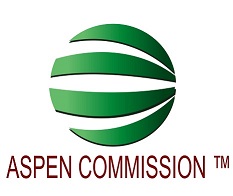ASPEN COMMISSION ™
THE CENTER FOR PHILOSOPHY POLITICS SPIRITUALITY AND SCIENCE ™
In his speech to the Arab Islamic American Summit in May 2017, the President outlined a shared goal with our international partners to conquer extremism and vanquish the forces of terrorism and the ideology that drives it.2 In support of this effort, the United States and our partners have accelerated the fight against ISIS, significantly degraded its safe havens in Iraq and Syria, and challenged its ability to operate around the world. However, ISIS continues adapting its tactics toward an insurgent and clandestine presence. ISIS continues to inspire and mobilize supporters and sympathizers through messaging, propaganda, and recruitment efforts. Al-Qa’ida (AQ) and its global network of affiliates remain determined to threaten U.S. interests. Regional and local terrorist groups also threaten U.S. citizens and our partners. Iran, the world’s leading state sponsor of terrorism, provides training, equipment, and financing for terrorist groups such as Hizballah and Hamas. The country is developing new proxy militia forces, comprised of over 100,000 non-Iranian fighters, to extend its influence, co-opt local security forces, and conduct lethal operations on Iran’s behalf across the Middle East. The Department of State and USAID’s overarching objective is to degrade global terrorism threats so local governments and security forces can contain them and restore stability. We will work to consolidate military gains against ISIS, AQ, and other terrorist organizations and stabilize liberated areas by supporting local partners that can reestablish the rule of law, manage conflict, and restore basic services. We believe that diplomatic engagement and targeted development assistance to stabilize affected areas will help prevent new recruitment, reduce levels of violence, promote legitimate governance structures that strengthen inclusion, and reduce policies that marginalize communities. As outlined by Secretary Tillerson in his remarks at the Hoover Institute in January 2018, we must deny ISIS and other terrorist organizations the opportunity to organize, raise funds, travel across borders, use communications technology to radicalize and recruit fighters, and to train, plan, and execute attacks.3 Strategies for Achieving this Objective The Department and USAID will play a key role in implementing the President’s plan to defeat ISIS, through leadership of the Global Coalition to Defeat ISIS. We will work multilaterally through institutions such as the United Nations, G7, and Global Counterterrorism Forum to promote international norms and good practices, and sustain trans-regional cooperation to prevent and counter terrorism. We will encourage regional organizations, national and local governments, civil society, faith based groups, and the private sector to counter these radical ideologies, as well as to prevent and mitigate conditions conducive to instability, radicalization, and terrorist recruitment. We will strengthen democratic, transparent, representative, and citizen-responsive governance and include the voices of women and marginalized communities, to increase the trust between government authorities and local populations. Where we have defeated terrorists in the field and ended their control of specific communities, we will support stabilization of liberated areas so that the terrorists cannot return. Syria is a special case in that no legitimate host-nation partner exists to provide effective security, governance, and economic activity in areas freed from ISIS. The way forward in Syria depends upon implementation of UNCSR 2254, including a political transition with international support. Interim arrangements that are truly representative and do not threaten neighboring states will speed the stabilization of liberated areas of Syria and set the conditions for constitutional reform and elections. The Department and USAID will prioritize their engagement and assistance to stabilize areas liberated from violent extremist organizations, particularly ISIS. We will use innovative approaches to encourage host government partners and civil society organizations to undertake critical reforms to establish legitimate governance, restore the rule of law, and address local grievances, particularly among women, religious and ethnic minorities, and other marginalized communities. Cross-Agency Collaboration The Department works with other federal agencies and our partner countries’ defense, law enforcement, and justice sectors to build and strengthen their institutional counterterrorism and other related capabilities, while reinforcing critical stabilization goals that make such efforts sustainable. We work closely with the Department of Defense to ensure coordinated security cooperation assistance. USAID designs and delivers programs targeting specific regional and local vulnerabilities, with a focus on improving governance and the ability of partners to assume responsibility for their own prevention efforts. These programs respond to on-the-ground conditions using an array of interventions. Risk Enemies of the United States will continue to modify and adapt their techniques, requiring the Department and USAID to increase diplomatic and development action, adjust strategies and stabilization initiatives, approaches, and programs quickly to counter constantly changing threats. This requires a flexible approach and strong collaboration, both within the U.S. Government and with our partners, to ensure we keep pace with threats and protect our homelands. We must remain vigilant regarding the threat of terrorism in ungoverned spaces, especially in conflict zones, which remain ripe breeding grounds for ISIS and other terrorist organizations.
|

World Markets
-- Teddy Roosevelt, 26th President of the United States of America
Aspen Commission ™ All Rights Reserved 1996-2025
IBS INTERNATIONAL BOARD OF STANDARDS
Aspen Commission Academy of International Relations, Philosphy Politics and Innovation - International Political Foregin Relations Public Policy Council. The Aspen Commission ™ is an Association Registered in Colorado and is also a listed as an Limited Company CO USA.
CEO Commission Join Mission Ethics Home Continuing Ed Government Jobs Awards Degrees Certification newspapers Diplomacy markets Links Careers Disclaimer
Accreditation and Recognition: GAFM * www.GAFM.org * www.CertifiedProjectManager.eu * www.AAFM.org * Certified Project Manager * Certified e-Commerce Consultant * Royal Law Society * Royal Business Society * Royal Business College * Royal Fellows * Royal Economics Academy * Oxford Law School * AAFM * Certified International Project Manager * www.GMentz.com * www.CertifiedProjectManager.org * www.GeorgeMentz.com * www.AAFM.us * www.icecc.com * www.reclaimingspirituality.com *